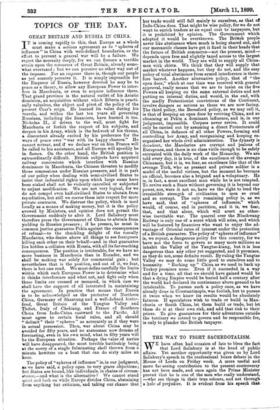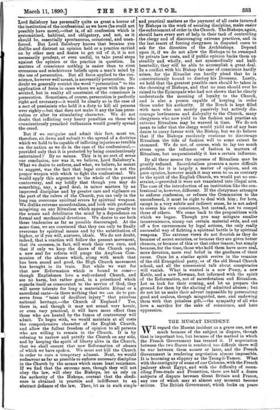THE WAY TO FIGHT SACERDOTALISM.
WE have often had occasion of late to bless the fact that Lord Salisbury is at the head of public affairs. Yet another opportunity was given us by Lord Salisbury's speech in the confessional boxes debate in the House of Lords on Friday week. A more useful and more far-seeing contribution to the present controversy has not been made, and once again the Prime Minister proved that he is one of the men who really understand, —who see things in their true colours, and not through a .10.10 of prejudice. It is evident from his speech that • Lord Salisbury has personally quite as great a horror of the institution of the confessional as we have (he could not possibly have more),—that is, of all confession which is systematised, habitual, and obligatory, and not, as it should be, essentially spontaneous, occasional, and unen- forced. But Lord Salisbury knows that because you dislike and distrust an opinion held or a practice carried on by other men and desire to get rid of it, it is not necessarily prudent, or even useful, to take penal steps against the opinion or the practice in question. In matters of conscience nothing is easier than to rivet erroneous and mischievous beliefs upon a man's mind by the use of persecution. But all force applied to the con- science, however well meant, is necessarily persecution. No doubt we generally restrict the word " persecution" to the application of force in cases where we agree with the per- secuted, but in reality all constraint of the conscience is persecution. Sometimes, of course, persecution is perfectly right and necessary—it would be clearly so in the case of a sect of pessimists who held it a duty to kill all persons over eighty—but that does not make it any the less perse. cution or alter its stimulating character. We do not doubt that inflicting very heavy penalties on those who conscientiously preached euthanasia would greatly spread the creed.
But if we recrignise and admit this fact, must we, therefore, sit down and submit to the spread of a doctrine which we hold to be capable of inflicting injuries so terrible on the nation as we do in the case of the confessional,— provided only that it is protected by being conscientiously entertained ? By no means. This is in no sort of sense our conclusion, nor was it, we believe, Lord Salisbury's. What we desire to enforce, and what, we believe, he meant to suggest, was the fact that legal coercion is not the proper weapon with which to fight the confessional. We would apply this argument to the whole of the present controversy, and say boldly that though you may do something, nay, a good deal, in minor matters by an improved discipline and by greater care and vigilance on the part of the rulers of the Church, you can only in the long run overcome spiritual errors by spiritual weapons. We dislike extreme sacerdotalism, and look with profound misgiving on any Ritualism which appeals too greatly to the senses and debilitates the mind by a dependence on formal and mechanical devotions. We desire to see both these tendencies as far as possible discouraged. At the same time, we are convinced that they can only be finally overcome by spiritual means and by the substitution of higher, or if you will, austerer, ideals. We do not doubt, indeed, that a reaction will follow the present movement, that its excesses, in fact, will work their own cure, and that if only we keep the doors of the Church open, a new zeal for reform will purge the Anglican Com- munion of the abuses which, along with much that has been sound and good, the High Church movement has brought in its train. But while we wait for that new Reformation which is bound to come— though Englishmen love a well-ordered Church, and see no harm, but rather good, in a priesthood which regards itself as consecrated to the service of God, they will never tolerate for long a materialistic Ritual or a sacerdotal caste—is there nothing that we can do to pre- serve from "taint of deadliest injury" that priceless national heritage,—the Church of England? Yes, there is, and though it may not sound very heroic, or even very practical, it will have more effect than those who are heated by the fumes of controversy will admit. To begin with, we would maintain at all costs the comprehensive character of the English Church, and allow the fullest freedom of opinion to all persons who are willing to remain in the Church. It is by refusing to narrow and petrify the Church on any side, and by keeping the spirit of liberty alive in the Church, that we shall ensure that new Reformation of abuses of which we have spoken. We must not kill the Church in order to cure a temporary ailment. Next, we would endeavour as far as possible to enforce necessary discipline in the Church by the means which cause least resistance. If we find that the extreme men, though they will not obey the law, will obey the Bishops, let us rely on the authority of the Bishops, content that the obedi- ence is obtained in practice and indifferent to an abstract defiance of the law. Then, let us in such simple and practical matters as the payment of all costs incurred by Bishops in the work of securing discipline, make easier the enforcement of order in the Church. The Bishops, again, should have every sort of help in their task of controlling the clergy and of discouraging extreme practices, and in the last resort of forcing clergymen in disputed cases to ask for the direction of the Archbishops. Depend upon it, if we do not allow the Bishops to be swamped by private law costs, and if public opinion backs them up steadily and wholly, and not spasmodically and half- heartedly, they will be able to accomplish a great deal. In a conflict with his Bishop the case of conscience hardly arises, for the Ritualist can hardly plead that he is conscientiously bound to disobey his Diocesan. Lastly, we hold that the greatest possible care should be taken in the choosing of Bishops, and that no man should ever be raised to the Episcopate who had not shown that he clearly understands the meaning of loyalty to the Church, and is also a person capable of keeping in order those under his authority. If the Bench is kept filled with men who not merely passively but actively dis- courage lawlessness and disloyalty to the Church, many clergymen who now yield to the fashion and practise an extreme Ritualism may be warned in time. We do not mean to infer that the clergy would yield out of any base desire to curry favour with the Bishop, but we do believe that if the Bishops resolutely continue to discourage Ritualism the tide of fashion will to some extent be stemmed. We do not, of course, wish to lay too much stress upon the influence of fashion in matters of Ritualism, but unquestionably it has a certain influence.
By all these means the excesses of Ritualism may be greatly reduced. Sac,erdotalism presents a more difficult problem, for it is largely a matter of opinion, and on pure opinion, however much it may seem to us as contrary to the spirit of the English Church, we would put no con- straint,—provided it were not translated into illegal acts. The case of the introduction of an institution like the con- fessional is, however, different. If the clergyman attempts to enforce confession, or refuses the Communion to the unconfessed, it must be right to deal with him ; for here, except in a very subtle and indirect sense, he is not asked to coerce his own conscience, but instead, not to compel those of others. We come back to the propositions with which we began. Though you may mitigate smaller inconveniences, stamp out certain material evils, and cut off a few excrescences by legal actions, the only really successful way of fighting a spiritual battle is by spiritual weapons. The extreme views do not •flourish as they do because of secret societies, or because they are given better chances, or because of this or that other reason, but simply because, for the time, those who hold them have more zeal, more devotion, more real belief in the goodness of their cause. Once let a similar spirit revive in the remains of the old Evangelical party, or of the old Broad Church school, and all the nonsensical talk about conspiracies will vanish. What is wanted is a new Pusey, a new Keble, and a new Newman, but informed with the spirit of the Reformation, not of sacerdotalism and Ritualism. Let us look for their coming,. and let us prepare the grouud for them by the abating of admitted abuses ; but do not let us make their advent impossible by persecuting good and zealous, though misguided, men, and endowing them with that priceless gift,—the sympathy of all who love a sacrifice for the sake of conscience, and hate oppression.







































 Previous page
Previous page